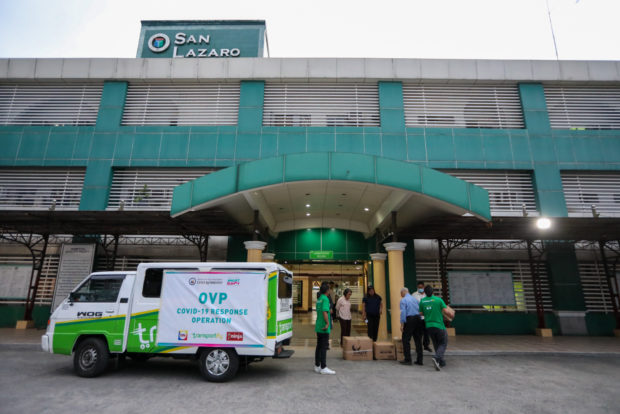
The Office of Vice President Leni Robredo (OVP) began to distribute personal protective equipment (PPE) sets to hospitals in Metro Manila on March 16, 2020, as part of its assistance drive for frontliners in the fight against COVID-19. Through the help of Transportify and Ninjavan, OVP staff delivered the PPE sets to San Lazaro Hospital in Sta. Cruz, Manila, to Philippine General Hospital in Ermita, Manila; and to University of the Philippines-National Institutes of Health, also in Ermita, Manila. VP Leni’s office has allotted P5.995 million of its funds to help provide PPE sets for 1,000 frontliners for 15 days. (Photo by Charlie Villegas / OVP)
MANILA, Philippines — As 2021 came to a close, the Office of the Vice President (OVP) looked back on its COVID-19 response during the second year of the pandemic—from its swab cab project in support of communities with high coronavirus transmission to its free telemedicine program in a bid to decongest hospitals.
An episode of Vice President Leni Robredo’s Sunday radio show, “BISErbisyong LENI,” recounted the programs and projects undertaken by her office during the second year of the health crisis.
Among these initiatives included the COVID-19 testing efforts of the OVP in “hotspot areas” as well as the launching of an online teleconsultation service in a bid to decongest health facilities.
The OVP allocated over P45.86 million for 35,656 extraction and detection kits. Some 2,750 extraction kits were given to the Research Institute for Tropical Medicine.
Swab Cab project
The OVP also launched in 2021 its Swab Cab project in communities with high levels of COVID-19 transmission and infection rates in a bid to curb the spread of the virus.
Some P11 million was allocated by the OVP for antigen test kits. Under the project, 9,757 people were tested in Malabon, Quezon City, Marikina City, Imus, Tuguegarao, and Naga.
In June, the OVP launched its Vaccine Express project, which was aimed to strengthen the vaccination drive of local governments.
The program was launched in 13 areas, namely, Cagayan de Oro, Misamis Oriental; Iriga at Naga sa Camarines Sur; San Pedro, Laguna; Magalang at San Fernando City, Pampanga; Capas, Tarlac; Malolos, Bulacan; Mariveles, Bataan; Catanduanes; and Manila, Pasig, and Quezon City in Metro Manila.
‘E-Konsulta’
During the rise of COVID-19 cases in April, the OVP put in place the Bayanihan E-Konsulta, a free telemedicine program that seeks to reach indigent and vulnerable families, decongest hospitals, and extend proper medical attention to those in need.
The Bayanihan E-Konsulta was started by OVP after observing that the country’s healthcare system was on the brink of collapse, with hospitals in the NCR Plus areas — meaning Metro Manila, Bulacan, Cavite, Laguna, and Rizal — already in full capacity.
This led Robredo and her office to devise ways to minimize contact of possible uninfected individuals seeking hospital services by having medical professionals assess their symptoms and conditions virtually, through messenger applications.
The program had 4,271 external volunteers and 1,327 volunteer doctors. More than 45,990 requests were processed under the program while 9,556 were given COVID-19 care kits.
In 2020, the first year of the pandemic, the OVP put together a total of P505.3 million in assistance for COVID-19 response and another P35.06 million for disaster relief operations, including those for the eruption of Taal Volcano in January that year and the series of typhoons from October to November.

